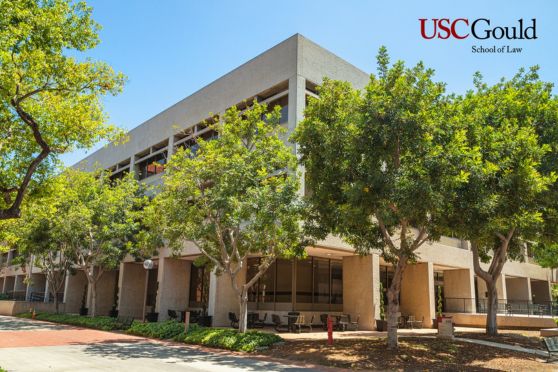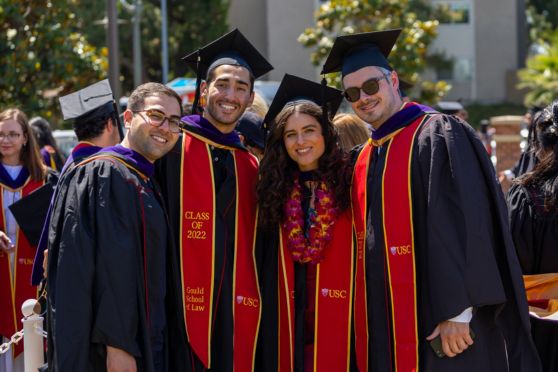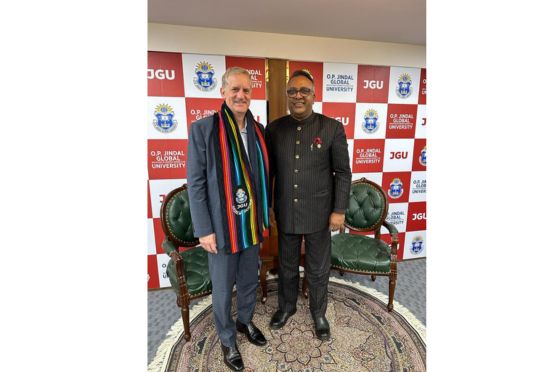University of Southern California could be the next pitstop for your law degree


Studying law is more than just about understanding the legal system, it helps one develop analytical and critical thinking skills, makes them good communicators, as well as opens the door to a plethora of career opportunities to explore. On the social front, it also empowers them to become flag-bearers of justice.
As the LSATs are around the corner, law aspirants from India who are eager to know what it must feel like to study at one of the world’s top universities for law, can hear it from the Dean of Gould School of Law, University of Southern California (USC).
In his recent visit to India for the signing ceremony to celebrate USC’s partnership with O.P. Jindal Global University, Andrew T. Guzman, Dean, USC Gould School of Law caught up with Edugraph to answer some of the questions a law aspirant might have. Along with Anitha Cadambi, Associate Director of Graduate Curriculum & Instruction and Adjunct Assistant Professor of Law, he shares some insight on the application process and what is it like to study in the States for a student from India. Read on to know more.
1. Why choose to study law?
Guzman: Law is fundamentally about helping people and people here might be a business, a government, or a company. But the legal system is complicated to navigate. Hence, people need a guide. And lawyers are that guide. Everything you do is in service of a client. If it's appealing to understand what a client needs, whether it's a human being or an institution, and the process of helping them to achieve their goal, makes law a rewarding profession.
Every day as a lawyer is different because the law may not change, but the people coming to it do, making every interaction different. When students graduate from law school, whether it's from an American JD or an American LLM, the majority of graduates go on to practice law in one capacity or another. But over their careers, they will very possibly change jobs many times, and they may not, they may leave the practice of law.
2. What makes one stick to this arduous yet rewarding career?
Guzman: Every morning, you wake up, and you have a new puzzle or a new problem to solve. When you solve it, you are not solving it for yourself, you're solving it for your client. You get to see someone else achieve their goals. You are constantly achieving things on behalf of someone else. And I think that is rewarding.
Also, If you move forward or decide that the practice of law as such is not what you want to do. You are not locked in, you know you have the skills that will take you places, which is not true in every profession. In some professions, the skills do not transfer easily. And the law provides you with that flexible exit ramp if you want it. But obviously, you do not have to take it, you can continue practising law for the rest of your career.

3. Law school in India & USA, What's the difference when it comes to education?
Guzman: The way we teach law in the United States is more distinctive than in India. Both are common law systems having the same origins in the British system and are in English. So that helps an Indian student coming to the US. But, our approach towards legal problems and questions is different.
If you watch an American classroom, you will see an enormous amount of back-and-forth conversation, where the professor asks students questions and the students answer. Dialogue is a fundamental part of how we think about the problem.
So, one of the values of American exposure and education is, having come from India where their students have learned one set of skills and one way of approaching it, they learn a different one in the United States. When they graduate, they leave with both of these skills in their toolkit.
4. India has several renowned private as well as public sector universities. Why study law at USC, what do they offer in terms future prospects?
Guzman: We're a highly-ranked US University with a terrific faculty, and that matters. When you have motivated, intelligent, ambitious students around you, it brings out the best in you, so the quality of the people is extremely important.
If you graduate from USC and come back to India, and then you meet someone who graduated 10 years earlier from USC, you will immediately bond with that person. Their first instinct will be to help you, and there will be a level of trust. This is important because you get this community of people all over the world, whom you can connect with at any time.
Additionally, we live in the greatest city in the world–Los Angeles is an incredible city. It's a great place to live for a couple of years. It also allows us as an institution to take advantage of high-performing lawyers who come into the law school. Maybe they teach a course, just a single class–come in just for an hour to talk to students.

5. What are the prospects of getting a job in that country?
Guzman: What we see with our graduates is a very large percentage of our graduates stay for one year after their LLM degree. They are permitted to do that under OPT, Optional Professional Training. Beyond that, a smaller group stay in a permanent job. And to do that, you need to secure a position with an employer who must sponsor you for the appropriate work visa. So that is a non-trivial thing. This is where the challenge lies.
While some people succeed in doing that and off they go, a larger number of people return to work in India, either because that was the plan all along, or because they decide they do not want a position in the United States or because they don't get one. But then they returned to India to these terrific jobs here, whether that is in government or with a big law firm, or in a company.
6. How difficult is it to get admission to the USC Gould school of law
Guzman: It's a competitive application process. We pay close attention to our international students, making sure their records are strong and try never to bring in someone who's going to fail. So we look very carefully and sort of look at all the metrics. And we can see they're going to succeed. We're intentionally trying to bring in the most talented people we can.
7. Speaking from your area of expertise, what are the issues you are interested in personally, where students interested in similar issues can get particular guidance?
Guzman: My area of interest is International Business Law. It most often turns out to be a common interest of our students because they're coming to a new country. It is an area where we are very strong, the job market is easy to understand. In that space, the employer you would typically meet coming out of a law program is a large law firm, either in the United States or in India, sometimes a large company that operates internationally, more commonly a law firm. For students interested in that, in some ways, that's the easiest model.
The employers are easy to identify, and the employers know, they have a practice of bringing in young lawyers in a pretty consistent way. So that works pretty smoothly, you still have to secure a position, but it's not mysterious. In some fields, where the jobs are fewer. There's less of a regular system for hiring lawyers, you have to do a little more legwork to find the position.

8. Is USC open to aspiring students having one-on-one interactions with the faculty during pre- admission stage?
It’s less formal, and the interaction of students with faculty is very easy. Students have access to every faculty member. You just show up during their office hours, and they'll talk to you. The access to the faculty is very easy, and the faculty do have areas of speciality. It's there on the website, it's easy to figure out who's who, and especially if you have a particular interest, you can figure out who the faculty you are most interested in.
9. Ms Cadambi, please share your experience of being an Indian student at USC, back in 2011.
Anitha Cadambi: The diversity of students that come from across the world. Some of them are accomplished attorneys in their home country, some are recent graduates. And so just the ability to have that exchange of conversation and interaction, I think made me a better student and lawyer as a result, two, the faculty were extremely kind, obviously, effective and competent in their areas of law. But I felt that whatever I was learning was extremely practical. And one of my favourite classes was counselling the startup company, and I'm from Bangalore, which is like the Silicon Valley of India.
Naturally, I was interested in that class. And I felt like from day one, all the way through the course of the semester, we've learnt through the different stages of a startup. And then I ended up working in that space. So everything I learned in class was almost immediately applicable to the clients I was serving.
10. Please mention any notable alumni, or projects where your students have been instrumental in bringing a change.
Some notable USC Gould Indian Alumni who have been instruments of change are:
Studying law can be an intellectually stimulating and rewarding experience that can lead to many career opportunities and personal growth. And USC Gould School of Law may be just the atmosphere you need for a holistic education in the subject. If you think this is for you, be sure to check out their website for more information.